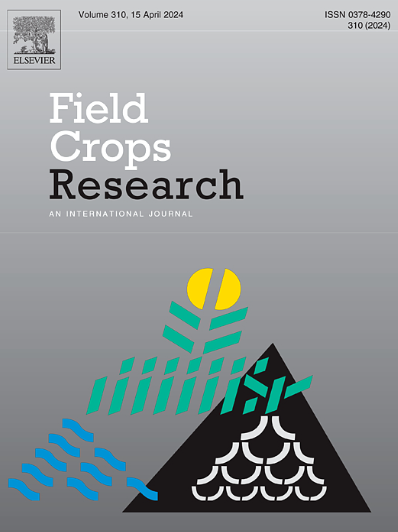Engineered silicate-solubilizing bacterial community alleviates nutrient stress in field-grown maize by enhancing silicon uptake and optimizing rhizosphere microecology
IF 6.4
1区 农林科学
Q1 AGRONOMY
引用次数: 0
Abstract
Context
Silicon (Si), as a functional element, is known to benefit the development and growth of cereals, especially under stress conditions. Si biofortification in crops using silicate-solubilizing bacteria (SSB) offers an eco-friendly biotechnique for enhancing crop resilience.
Objective
This study aimed to test the effectiveness of a synthetic community of SSBs (SSB SynCom), isolated from across the country for high silica degradation capacity, in supporting competitive maize yields with reduced fertilizer application.
Methods
A two-year field experiment was conducted to compare the effect of SSB SynCom on maize growth, yield and rhizosphere microecology with reduced fertilizer application.
Results
The application of SSB SynCom significantly increased biomass and yield in maize under nutritional stress, particularly nitrogen (N) deficiency. Leaf photosynthetic capacity, Si concentration, and the expression levels of Si transporter genes were notably enhanced with SSB SynCom, along with significant changes in rhizosphere microecology. Notably, N and Si concentration in the shoots were strongly correlated. Additionally, several key microbial genera showed significant positive associations with the nutritional status of the host plant.
Conclusion
The investigated SSB SynCom proved to be a highly effective microbial agent for improving yield via N-Si interactions in field-grown maize with reduced fertilizer input, offering new avenues for sustainable agricultural development.
工程硅酸盐增溶菌群通过提高玉米对硅的吸收和优化根际微生态来缓解大田玉米的营养胁迫
硅(Si)作为一种功能元素,被认为有利于谷物的发育和生长,特别是在逆境条件下。利用硅酸盐增溶菌(SSB)在作物中进行硅生物强化是一种提高作物抗逆性的生态友好型生物技术。本研究旨在测试从全国各地分离到的SSB合成群落(SSB SynCom)在减少肥料施用的情况下支持竞争性玉米产量的有效性。方法采用为期2年的田间试验,比较减施SSB SynCom对玉米生长、产量和根际微生态的影响。结果施SSB SynCom能显著提高营养胁迫下玉米的生物量和产量,特别是氮缺乏玉米。SSB SynCom显著提高了叶片光合能力、硅浓度和硅转运体基因的表达水平,并显著改变了根际微生态。其中,氮、硅含量呈极显著正相关。此外,一些关键的微生物属与寄主植物的营养状况有显著的正相关。结论所研究的SSB SynCom是一种高效的微生物制剂,可在减少化肥投入的情况下通过氮硅相互作用提高玉米产量,为农业可持续发展提供了新的途径。
本文章由计算机程序翻译,如有差异,请以英文原文为准。
求助全文
约1分钟内获得全文
求助全文
来源期刊

Field Crops Research
农林科学-农艺学
CiteScore
9.60
自引率
12.10%
发文量
307
审稿时长
46 days
期刊介绍:
Field Crops Research is an international journal publishing scientific articles on:
√ experimental and modelling research at field, farm and landscape levels
on temperate and tropical crops and cropping systems,
with a focus on crop ecology and physiology, agronomy, and plant genetics and breeding.
 求助内容:
求助内容: 应助结果提醒方式:
应助结果提醒方式:


